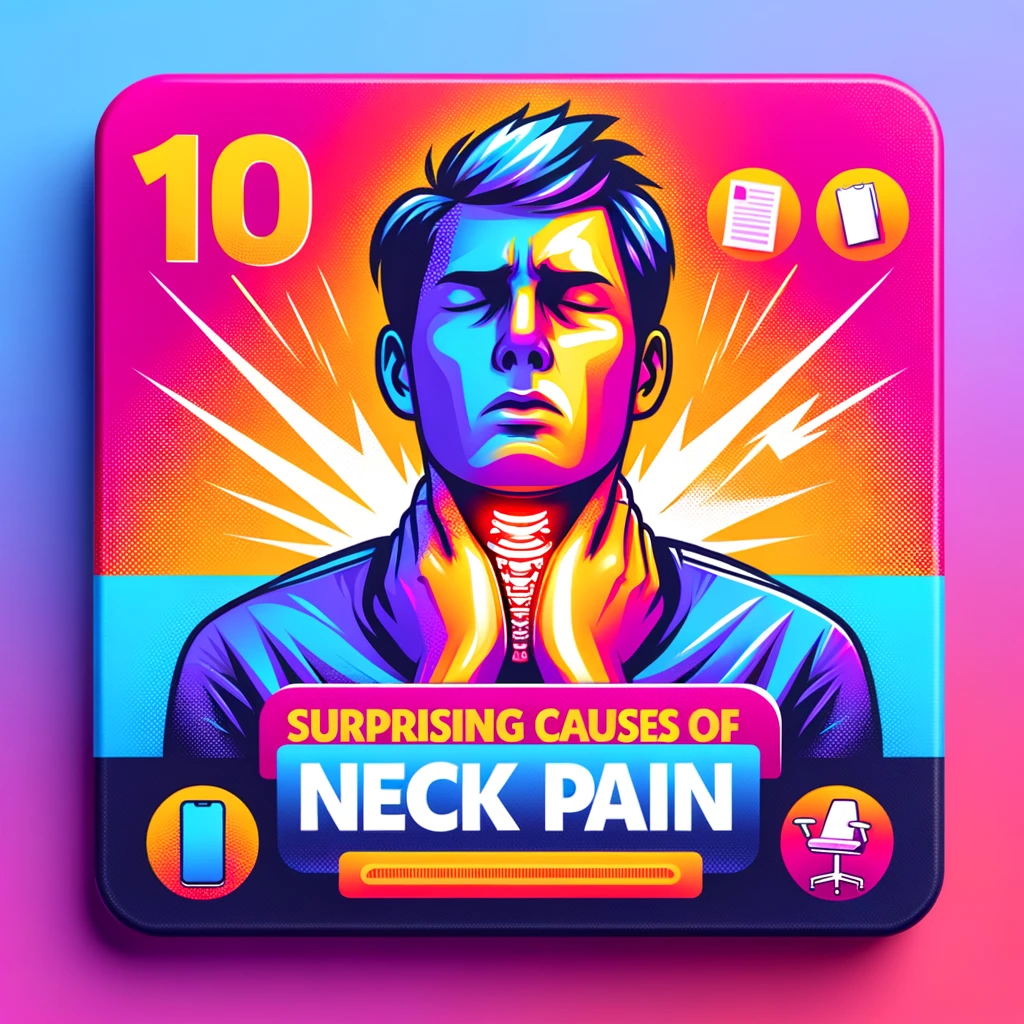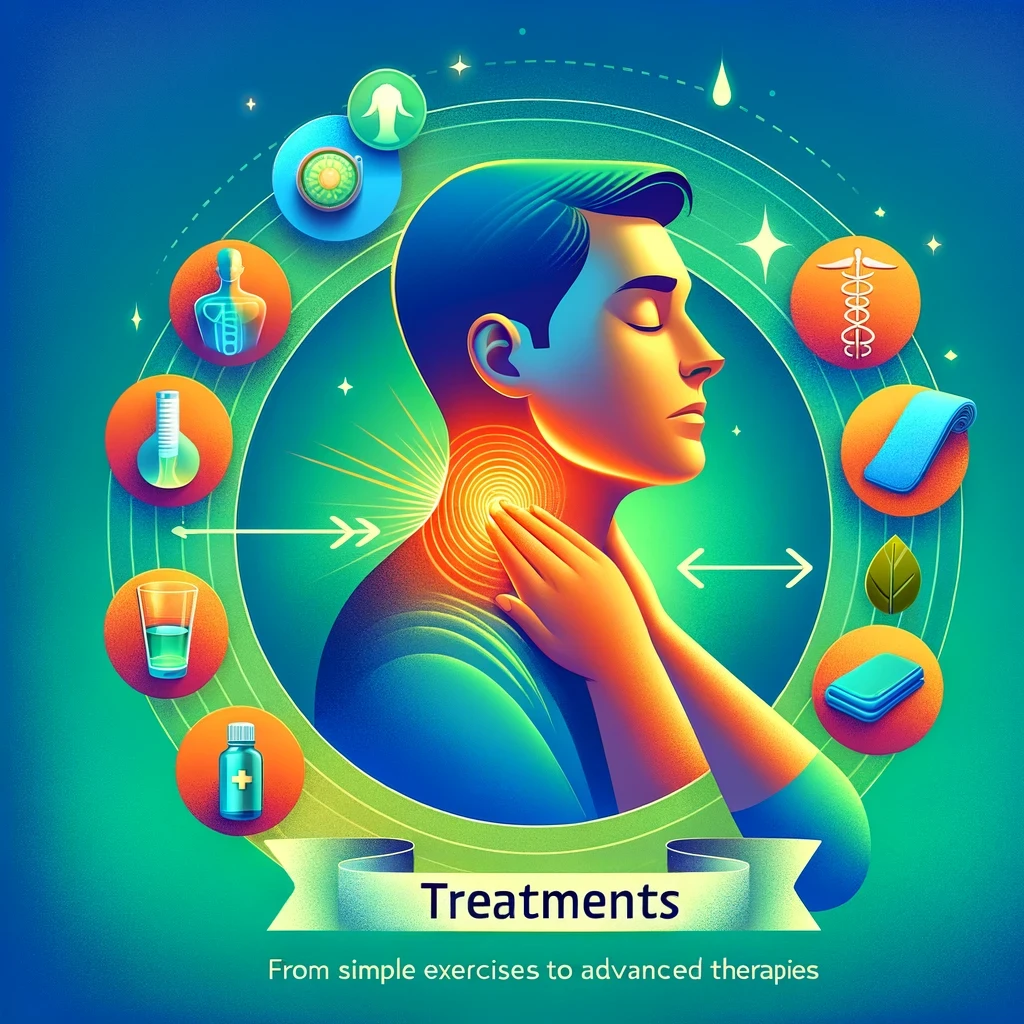
Table of Contents
Neck pain is an all-too-common complaint in today’s fast-paced world. It can sneak up on you, turning simple activities into painful chores. Understanding the root causes of neck pain is the first step toward relief and prevention. Let’s explore ten surprising reasons why your neck might be hurting.
1. Postural Strain
Modern Lifestyle and Technology
One of the primary causes of neck pain is our modern lifestyle, dominated by technology. Hours spent hunched over smartphones and computers can strain the neck muscles, leading to discomfort and pain. This phenomenon, often referred to as “tech neck,” is becoming increasingly common.
Incorrect Sleeping Positions
Your sleeping position can significantly impact neck health. Using an inappropriate pillow or sleeping in awkward positions can lead to neck strain. Ensuring your pillow supports the natural curve of your neck and using a mattress that keeps your spine aligned are crucial steps toward a pain-free neck.
2. Stress and Anxiety
Physical Manifestations of Stress
Stress doesn’t just affect your mind; it can have physical repercussions, too. When you’re stressed, your muscles tense up, especially those in your neck and shoulders. This tension can cause chronic neck pain.
Techniques for Stress Management
Managing stress through relaxation techniques such as deep breathing, meditation, and yoga can help reduce muscle tension and alleviate neck pain. Incorporating these practices into your daily routine can make a significant difference.
3. Poor Ergonomics
Workplace Setup
Poor ergonomics at your workplace can lead to neck pain. Ensure your desk and chair are positioned correctly to promote good posture. Your computer screen should be at eye level to avoid straining your neck.
Home Office Adjustments
With more people working from home, creating an ergonomic home office setup is essential. Investing in ergonomic accessories like adjustable chairs, keyboard trays, and monitor stands can help prevent neck pain.
4. Sedentary Lifestyle
Lack of Physical Activity
A sedentary lifestyle can contribute to neck pain. Sitting for prolonged periods without movement can lead to muscle stiffness and pain. It’s important to incorporate physical activity into your daily routine to keep your muscles flexible and strong.
Simple Exercises to Stay Active
Simple exercises, such as neck stretches, shoulder rolls, and periodic movement breaks, can help alleviate and prevent neck pain. Aim to move around and stretch at least every hour during prolonged sitting.
5. Injury and Trauma
Whiplash from Accidents
Injuries such as whiplash, often resulting from car accidents, can cause significant neck pain. Whiplash occurs when the neck is suddenly forced forward and then backward, leading to muscle and ligament damage.
Sports-Related Injuries
Athletes are also prone to neck injuries, particularly in contact sports like football and rugby. These injuries can range from minor muscle strains to more severe conditions requiring medical intervention.
6. Degenerative Disc Disease
Understanding the Condition
Degenerative disc disease is a condition where the intervertebral discs in the spine deteriorate over time. This can lead to chronic neck pain, stiffness, and reduced range of motion.
Treatment Options
Treatment options for degenerative disc disease include physical therapy, medications, and in severe cases, surgery. Maintaining good posture and staying active can help manage symptoms.
7. Cervical Spondylosis
Age-Related Changes
Cervical spondylosis, also known as neck arthritis, is an age-related condition caused by the wear and tear of cartilage and bones in the cervical spine. This condition can lead to chronic neck pain and stiffness.
Managing Symptoms
Managing symptoms of cervical spondylosis involves regular exercise, maintaining a healthy weight, and using pain relief medications as prescribed. Physical therapy can also be beneficial.
8. Sleeping Disorders
Impact of Sleep Quality on Neck Pain
Poor sleep quality can exacerbate neck pain. Sleeping in awkward positions or using an unsupportive pillow can lead to muscle strain and discomfort.
Tips for Better Sleep
To improve sleep quality and reduce neck pain, ensure you have a supportive pillow that keeps your neck aligned with your spine. Maintaining a consistent sleep schedule and creating a relaxing bedtime routine can also help.
9. Dehydration
Role of Hydration in Muscle Function
Dehydration can lead to muscle cramps and stiffness, including in the neck. Ensuring you drink enough water throughout the day is crucial for maintaining muscle function and preventing pain.
Staying Hydrated
Aim to drink at least 8 glasses of water a day, and more if you are physically active or live in a hot climate. Incorporating water-rich foods into your diet can also help you stay hydrated.
10. Underlying Medical Conditions
Arthritis
Arthritis, including osteoarthritis and rheumatoid arthritis, can cause neck pain. These conditions involve inflammation of the joints, which can lead to chronic pain and stiffness.
Infections and Tumors
Though rare, infections and tumors can also cause neck pain. These conditions require prompt medical attention and treatment.
Conclusion
Understanding the causes of neck pain is the first step toward finding relief and preventing future discomfort. From poor posture and stress to underlying medical conditions, many factors can contribute to neck pain. If you’re experiencing persistent or severe pain, it’s essential to seek medical advice for proper diagnosis and treatment.
FAQs
How can I tell if my neck pain is serious?
If your neck pain is accompanied by numbness, tingling, severe headaches, or if it persists for more than a few weeks despite home treatment, it’s important to see a doctor.
What are the best sleeping positions to avoid neck pain?
Sleeping on your back or side with a supportive pillow that keeps your neck aligned with your spine is best. Avoid sleeping on your stomach, as it can strain your neck.
Can dehydration really cause neck pain?
Yes, dehydration can lead to muscle cramps and stiffness, including in the neck. Staying hydrated is essential for maintaining muscle function and preventing pain.
How often should I take breaks to prevent neck pain while working?
Take breaks every hour to stretch and move around. Simple neck and shoulder stretches can help alleviate and prevent pain.
When should I see a doctor for neck pain?
You should see a doctor if you experience persistent pain, numbness, tingling, severe headaches or if your neck pain is the result of an injury.


